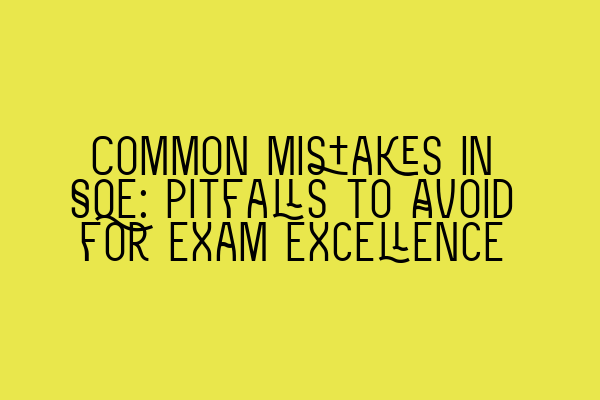Are you preparing for the SQE exam? Do you want to avoid common mistakes that can hinder your chances of exam success? In this blog post, we will discuss some of the most common pitfalls that students often fall into when preparing for the SQE exam and provide you with tips on how to avoid them. So, let’s dive in!
Mistake #1: Not Understanding the Exam Structure
One of the biggest mistakes that students make is not fully understanding the structure of the SQE exam. The SQE is a two-part exam that consists of multiple-choice questions and practical assessments. It is crucial to familiarize yourself with the exam format, including the number of questions, time constraints, and the breakdown of topics. This will help you allocate your study time effectively and ensure that you are adequately prepared for each section of the exam.
Mistake #2: Not Practicing Enough
Practice makes perfect, and this holds true for the SQE exam as well. Many students underestimate the importance of practicing sample questions and mock exams. By practicing regularly, you can familiarize yourself with the exam style, improve your time-management skills, and identify areas where you need to focus your studies. Make use of practice resources provided by training providers or seek out additional mock exams to enhance your preparation.
Mistake #3: Neglecting the Legal Skills Assessments
While it is essential to have a solid understanding of legal principles and concepts, the SQE exam also assesses your practical skills. The legal skills assessments require you to demonstrate your ability to apply legal knowledge to real-world scenarios. It is crucial not to prioritize theoretical knowledge at the expense of developing practical skills. Make sure you allocate sufficient time to practice legal skills assessments such as client interviewing, legal research, and writing tasks.
Mistake #4: Focusing Only on Black-Letter Law
While having a strong grasp of black-letter law is undoubtedly important, it is equally crucial to understand the broader legal context. The SQE exam assesses your ability to apply the law to real-life situations, so having a thorough understanding of legal principles and how they are applied in practice is essential. Don’t just focus on memorizing statutes and cases; ensure that you can analyze and critically evaluate legal issues.
Mistake #5: Not Seeking Support
Preparing for the SQE exam can be overwhelming, but you don’t have to do it alone. Many students make the mistake of not seeking support from their peers, tutors, or study groups. Engaging in discussions, seeking clarification, and receiving feedback can significantly enhance your understanding of complex legal concepts. Additionally, joining online forums or attending study groups can provide a sense of community and motivation.
Mistake #6: Neglecting Exam Technique
Even if you have an excellent understanding of the law, poor exam technique can undermine your performance. Time management, question comprehension, and structuring your answers are crucial elements of exam technique. Familiarize yourself with past exam papers, analyze sample answers, and practice writing concise and well-structured responses.
Mistake #7: Not Taking Care of Yourself
Preparing for the SQE exam can be stressful, and many students neglect their physical and mental well-being during this period. It is important to take breaks, exercise, eat well, and get ample rest. Taking care of yourself will ensure that you are functioning at your best both mentally and physically, allowing you to study more effectively and perform better in the exam.
Avoiding these common mistakes can significantly increase your chances of success in the SQE exam. Remember to familiarize yourself with the exam structure, practice regularly, focus on developing practical skills, understand the broader legal context, seek support, refine your exam technique, and take care of yourself. Good luck with your SQE exam preparation!
Related Articles:
Joint Ownership: Legal Considerations for Co-Owners of Property
Commercial Leases: Essential Insights for Business Premises
Tenant Rights in the UK: Understanding Your Legal Protections
Property Transactions and the Legal Process: A Comprehensive Guide
Examining the Intricacies of Land Law in the UK

Leave a Reply